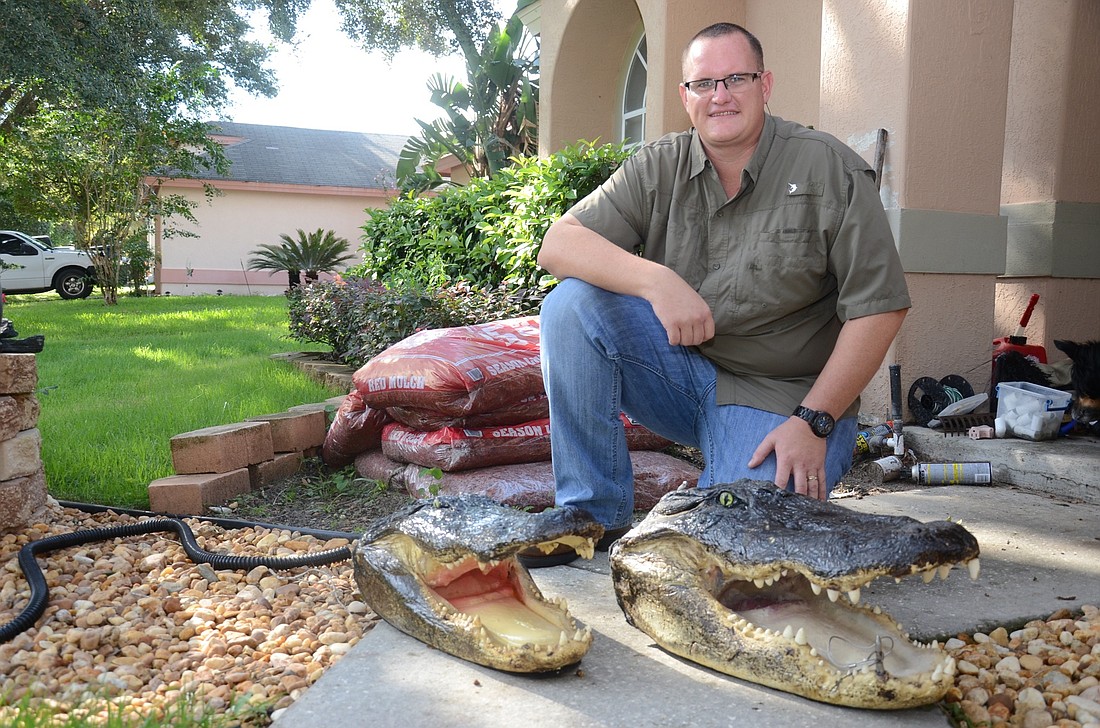- January 14, 2025
-
-
Loading

Loading

After sighting a 12-foot-1-inch alligator, most people would try to keep a safe distance away.
But William Gray isn’t most people.
The Ocoee resident is an avid outdoorsman who enjoys fishing and hunting. Gray got into alligator hunting about seven years ago, and Saturday, Sept. 24, he caught his largest gator yet — a 12-foot-1-inch beast in Lake Monroe.
“It’s one of those things that’s kind of a bit of an adrenaline rush,” Gray said. “Once I started doing it, it was something that kind of stuck with me.”
Although hunters get a rush from the sport, alligator hunting also requires a great deal of patience, awareness and — many times — sleep deprivation.
Hunters take to the water between 5 p.m. and 10 a.m. on the nights they are legally allowed to hunt. Gray and his fellow hunters board a 17-foot skiff boat, and after dark, they shine a light on the water to see if they can spot gators. They typically search for the alligators farther away from the shoreline, because these gators tend to be the largest.
Once the hunters get close enough to a gator, they will turn the engine down and cast a reel or rod, or throw the harpoon to hook into the gator. Sometimes, a snatch hook with a rope is needed to attach to the gator.
When the gator is back at the surface, the hunters stick another line into the gator and pull it beside the boat, then sever the gator’s spine, which is the most humane way to kill the gator, Gray said.
Gray spotted his recent catch in Lake Monroe at about 11 p.m. The hunters moved the boat about 100 yards away from the gator. Each time the gator dipped below the water, Gray and his friends stopped the boat. When the gator resurfaced, they would inch closer.
It wasn’t until two hours later — at 1 a.m. — when they actually hooked into the gator with a rod. It took another hour before the hunters could get another harpoon line into the gator.
“He just wanted to pull the boat around like it was nothing,” Gray said. “It was quite the adrenaline rush. I remember when his head came up beside the boat, we were like, ‘Oh my gosh, what a monster!’”
It was 3 a.m. before the hunters had the gator in the boat.
It’s not a sport for the faint of heart. It requires much patience and can be dangerous if hunters aren’t properly prepared or aware of their surrounding.
“It’s one of those things that does get your adrenaline pumping, but at the same time, you have to be very cautious on what you’re doing,” Gray said. “One mess up, and it’s over with. You can lose an arm or leg or anything. When they come up beside the boat, they’re usually pretty mad.”
On the weeks when Gray is gator hunting, he usually gets only a few hours of sleep. After his job as a funeral director, he returns home and gets ready for a night out on the water.
Contact Jennifer Nesslar at [email protected].
Each year, the state of Florida holds a lottery drawing to award licenses for alligator hunting. If a person is selected, he or she receives two tags, which allows him or her to hunt two alligators. If selected, hunters also are given different regions to hunt. Hunters will receive a countywide license, which allows them to hunt in most bodies of water throughout the county, or a harvest unit, which allows you to hunt a specific body of water, such as a lake. Gray received Lake Monroe as his region this year.
In 2016, hunting season extends from Aug. 15 to Nov. 1, but hunters do not get to participate during the entire season. During the first four weeks of the season, hunters get assigned one week where they are permitted to hunt. During the final seven weeks of the season, all licensed hunters are permitted to hunt.
Florida residents also can obtain an alligator trapping agent license if they would like to assist licensed hunters in the hunt.
Hunting can only occur between 5 p.m. and 10 a.m.
For more information, visit bit.ly/2d94G1O.
Dennis Jones, the owner of Winter Garden Wheel Works, noticed something unusual on a regular bicycle ride along the Lake Apopka Wildlife Drive.
The bike trail separates Lake Apopka from a pond, where Jones and his friends saw more than 50 alligators. The video, taken by the cyclists, has gone somewhat viral in the Orlando area.
Jones said he had never seen so many alligators in that area. He makes the trip regularly depending on his work schedule.
View the video on Winter Garden Wheel Works’ Facebook page, facebook.com/wintergarden.wheelworks